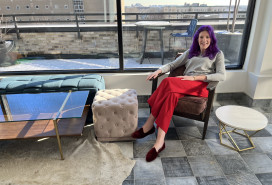The hidden costs of affordable housing

Lars Plougmann/Flickr
When my significant other and I moved into one of Manhattan's much-sought-after affordable housing units in a luxury building in midtown Manhattan, all of our friends said it was a dream come true. Getting this apartment means we can afford to live in New York City for the rest of our lives. The stabilized rent of $770 per month is doable for us. However, we were able to secure this place only because my parents helped us out financially.
Some background: It took from December of 2015, when we applied online for this building's 80/20 housing lottery until late July 2016 when we were called for an interview. After reviewing three years of our financial lives on paper and asking us dozens of questions, our interviewer deemed us eligible for a one-bedroom. We didn't hear anything until three months later when we were fast-tracked through the certification and lease-up processes. We then moved into our new place in early September of this year.
Upfront costs
First, there are the move-in fees, which include first month's rent and security, which overlapped with the last month's rent that we still had to pay at our former apartment. Area rugs or carpeting in our new apartment are mandatory to muffle sound, but rugs are very expensive and we are low income, so how could we possibly afford to purchase them? (We will have our apartment inspected annually so we have to comply.)
We were required to use a licensed moving company, but received a $500 offset of partial payment through our new building’s affordable housing program, which surprised us but was very welcome. Still, we ended up paying almost $1,000 out of pocket for the remainder of the amount – we had a lot of stuff! Where would we have found that dough if we couldn't have turned to my family?
Emotional costs
A new occupant at an affordable housing unit in an older building in Brooklyn, who asked to remain anonymous, describes his experience like this: "I didn't have a lease at my place before this one and was going month to month. I let my landlady know that I'd been interviewed. I signed my new lease in the middle of the month and got the keys that day, so I had two apartments for half a month," meaning he had to find the funds to cover both for a few weeks.
But, he adds, "the greatest cost so far has been the strain on my relationship. For better or for worse, my partner and I were looking for an apartment to move into together at the same time I got called for an [affordable housing] interview. My partner was living in another city, working full time, and couldn't attend the interview. We decided that I would go alone and we'd figure out how to get them in later. I was told in my interview that I couldn't move anybody in without written permission, so I thought, 'Okay. No problem'."
He moved in and, a few weeks later, asked about the process of having another person share the apartment. "The answer I got was, 'Absolutely not.' They said I had just moved in and needed to give it some time. They said, 'If you wanted somebody to move with you, you two should've applied together. It looks like you were planning this all along, and even if you weren't, we care more about how it looks than how it is'." He has only one key to the door of his building and is unable to make a copy.
This is standard practice: Affordable housing has very strict rules about who can have a set of keys and making copies yourself is impossible. The regulations about occupants of the unit are similarly rigid: only applicants can occupy the apartment, and full-time students are not allowed. Occupants are also not allowed to move anyone into their apartment during the first year of their lease, regardless of relationship status.
The Brooklyn resident's partner is starting a graduate program in NYC this fall. His partner started looking for a new place, but had trouble finding one. "My partner resented me for taking this apartment, and it seemed like we were on the verge of splitting up."
The couple finally decided that it wasn't worth the stress, and that they would move in together anyway and ask permission again later. As of now, they're figuring out how to share one set of keys.
All of us know we have a great deal paying affordable rent while living in a new or upgraded apartment. But, our situations are not as idyllic as they might seem. The high cost of securing our apartment makes me think it might be impossible for other housing lottery winners to afford to move into an "affordable" apartment.
You Might Also Like






















